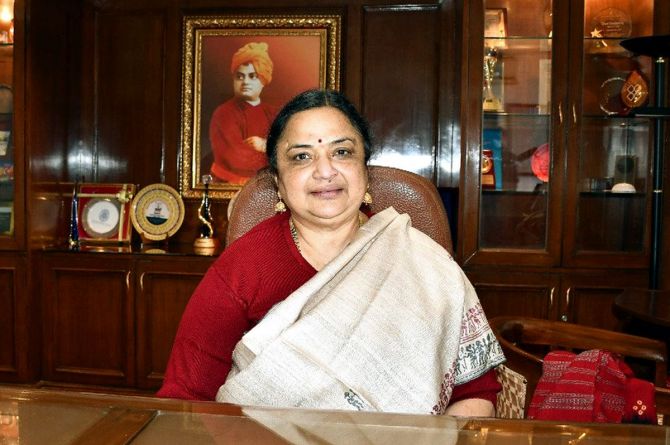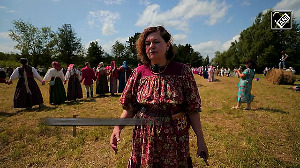Santishree Dhulipudi Pandit won't be afraid to tangle with the toughest of them, says Aditi Phadnis.

Jhelum is one of the oldest hostels at Jawaharlal Nehru University, New Delhi. Close to the now famous Ganga dhaba, it started functioning in 1977 and initially, only for girls. It later accommodated boys in one wing and girls in another but all students shared the mess -- for India, a unique but highly successful experiment.
Later, it turned into an all-boys hostel. But before that happened, it had a woman president: Santishree Dhulipudi, now Pandit, 59, who has been appointed vice- chancellor of the university where she achieved some of her highest academic pinnacles.
In those days, JNU could be suffocating, if you were public spirited but not left-wing. Pandit (Santi to friends) was aggressive, extremely bright but bitterly anti-Left. Her peers recall that she would freely mention her connections with the Congress (she told friends her father was press officer to Indira Gandhi -- slightly inaccurate as it happens).
Her father was a well-known and highly respected journalist, D Anjaneyulu, who was Telugu but shifted to Chennai and rose to head the Press Information Bureau in that city. He was also a founder of the Madras Press Club.
Anjaneyulu was a family friend of Congress leader G K Moopanar -- and when his daughter was a student at JNU, Moopanar was a kind of local guardian.
Santi was born in St Petersburg: her mother, whom she lost quite early in life, was a professor of Tamil and Telugu at Leningrad University. But Santi grew up as a polyglot in a household where education was highly valued.
It was the early 1980s. On the JNU campus, Congress sympathisers were seen as social deviants. But not Santi, who wore her affiliation as a badge of courage and told friends unabashedly that she was going to Rajiv Gandhi's for breakfast.
"She was brilliant with repartee and had a wicked sense of humour. And a loud, loud voice -- you could tell Santi was coming much before you saw her," recalled a hostel mate.
Most who made it to JNU had to have had a good academic record -- actually, you needed to be the best of the best to be able to get there.
Santi was no exception. Her CV, which runs into 22 pages, shows she has never come second, always first. That gave her a sense of confidence: And the courage to stand up to bullies, her colleagues testify.
Her PhD, from the School of International Studies, was on Parliament and foreign policy in India -- the Nehru Years.
Much later, she would turn her research to develop a political critique of India's policy towards China, even if articulated in quite basic terms.
Speaking publicly (September 2020), she noted that there were a lot of apologists for China in India, who will hold India responsible for the Galwan stand-off with China.
'If one Muslim is killed in India, they (the apologists) will say minorities are in danger in India. But if there is a systematic campaign by the Chinese Communist party to exterminate all minorities -- Tibetans or Uighurs -- they won't open their mouths,' she said.
She also said Indian historiography left a lot to be desired: While a few centuries of medieval India had been studied to death, there was no corresponding attention to the Chola empire, for instance, which had contributed as much to the creation of India as a nation.
While this may or may not be true, what it does demonstrate is that the new vice chancellor of JNU has travelled a long way ideologically.
"She was incredibly bright. And incredibly hard-working. And she had the most beautiful hand-writing," recalled a former JNU student.
JNU was dominated by students from Bihar, Odisha and Bengal. South Indians were a somewhat timid presence. But not Santi, who spoke up when she could.
"We were just a bunch of kids who had no idea what we were going to do. But she knew exactly what she needed to do, where she had to go. And she was completely focused on getting there," said a former student.
JNU, where it stands today, faces many, many challenges. The biggest is its autonomy and democratic character.
If two out of five members of the current Cabinet Committee on Security -- Foreign Minister S Jaishankar and Finance Minister Nirmala Sitharaman -- are from JNU, it stands to reason that it must be an outstanding place of learning.
This is largely because the institution has been allowed to grow organically. It does not respond well to external pressure: An upheaval rocked the campus when outgoing VC M Jagadesh Kumar tried to impose a system of compulsory attendance. Later, he felt that the nationalism deficit on the campus could be made up by having a tank (like the Vijayanta) installed there.
As vice chancellor, Santishree Dhulipudi Pandit is going to stand for no nonsense. And she won't be afraid to tangle with the toughest of them.
It is possible that she will have empathy for the place that nurtured her ambition and allowed her to grow.
But as she might appreciate, JNU will not allow itself to become a guided democracy.












